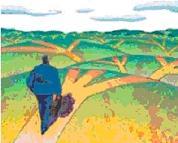 Benjamin Libet's Personal View of Free Will.
Benjamin Libet's Personal View of Free Will."If the moon, in the act of completing its eternal way around the earth, were gifted with self-consciousness, it would feel thoroughly convinced that it was travelling its way of its own accord on the strength of a resolution taken once and for all. So would a Being, endowed with higher insight and more perfect intelligence, watching man and his doings, smile about man’s illusion that he was acting according to his own free will." (Attributed to Albert Einstein in the promotion site for Libet's The Volitional Brain. Perhaps from Einstein's autobiography, The World As I See It, in which he addresses his deterministic view of the universe.)
Most scientific thought concurs that the universe is deterministic and that the sense of free will is an illusion. That is, except for those who take into account chaos theory at the macro level, and quantum mechanics at the micro. The question remains, as posed by T.S. Eliot:
Between the conception
And the creation
Between the emotion
And the response
Falls the Shadow
Benjamin Libet conducted now famous experiments that seemed to light up the shadow. Essentially, they were that a subject thought he had made a decision to act, but instead the action occurred about a half second before the sense of a decision. The decision was illusory. The action involved no agent, no choosing person, but instead happened, with the sense of control ocurring afterward.
Despite the evidence of his own experiments, Benjamin Libet allows some room for free will in an otherwise deterministic world. He provides many of his arguments in The Volitional Brain (Libet, Freeman, & Sutherland, 1999).
Libet has this to say about his methods: "I have taken an experimental approach to this question. Freely voluntary acts are preceded by a specific electrical change in the brain (the 'readiness potential', RP) that begins 550 ms before the act. Human subjects became aware of intention to act 350-400 ms after RP starts, but 200 ms. before the motor act. The volitional process is therefore initiated unconsciously. But the conscious function could still control the outcome; it can veto the act. Free will is therefore not excluded. These findings put constraints on views of how free will may operate; it would not initiate a voluntary act but it could control performance of the act. The findings also affect views of guilt and responsibility. But the deeper question still remains: Are freely voluntary acts subject to macro-deterministic laws or can they appear without such constraints, non-determined by natural laws and 'truly free'? I shall present an experimentalist view about these fundamental philosophical opposites."
He has several justifications, one of which is that many readiness potentials are produced by the brain although only one is acted upon. Another is that the conscious mind can veto actions before they are performed. Into this he tosses the notion of "consciousness fields," which is more supposition than evidence-based theory. I will add to that chaos theory and quantum mechanics.
Critics argue that he has created a homonculus, a little man inside, who over-rides unconscious urges to act, but his own experiments verify that such vetos do occur. In this regard, the burden of explaining away the evidence lies with his critics, for subjects are indeed able to stop actions within a very narrow window of time. This has been established by Libet's own experiments.
I should add that good Doctor Einstein was a determinist to the core, which was why he could never accept--call it what you will--quantum mechanics, wave funcion collapse, superposition theory, and especially Neils Bohr's Copenhagen Interpretation of what is happening at that level. He couldn't accept any of it but history has passed him by in that regard.

No comments:
Post a Comment